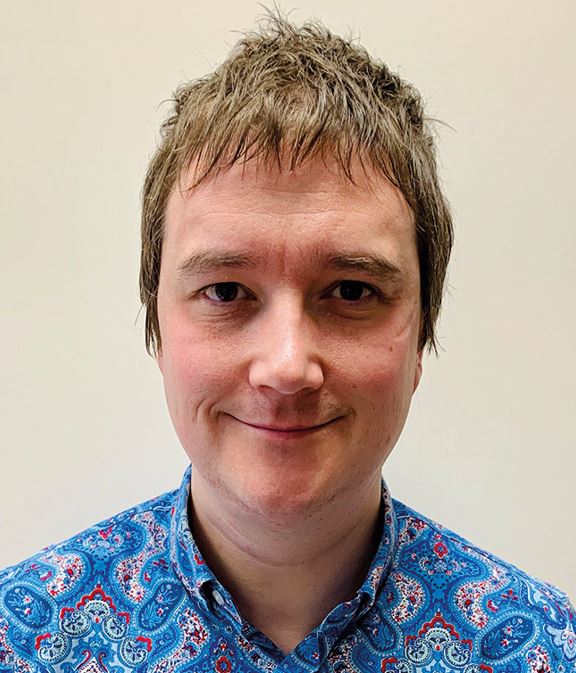
Having submitted a complaint as an inpatient, he became a public governor for Keighley and helps improve and consult on services for Bradford District NHS Foundation Trust. Nick’s interest in design for good mental health has given him a keen eye and his incisive feedback has benefited many members of the Design in Mental Health product and architect community in previous years. His passion is for mental health spaces to be safe, comfortable and inspiring.
PLEASE CAN YOU PROVIDE DETAILS ON YOUR BACKGROUND AND HEALTHCARE CHALLENGES?
I had a working-class upbringing in Keighley West Yorkshire. I have a younger brother & older half-sister. My mum was an abusive alcoholic and my dad was emotionally distant and worked long hours. I saw my parents being very violent to each other. I used to get hit a lot and made to feel unwanted. My Dad left when I was seven and my mum deteriorated into a dark time of more alcohol and suicide attempts. Mum remarried a violent and controlling man who nearly killed her and was violent towards us. I wasn’t popular at school and didn’t do very well academically. My Mum and stepdad spent most days in the pub. I only saw my dad and step mum at weekends but often stayed at my grandmas, which was my only safe place. Health was ok apart from malnourishment. Due to my mum’s behaviour, I developed dark thoughts at nine, making plans to end me or my mum’s life. My brother and I went into foster care when I was 13 after mum tried to kill my brother. In foster care I developed a liking for drinking and became increasingly unstable mentally.
WHAT WERE THE ISSUES THAT YOU FACED AS A SERVICE USER?
The “Us” and “Them” relationship. Not being able to connect to the therapists. The buildings/offices were uncomfortable and nasty. I felt I couldn’t be honest due to the fear of being treated like I was a “nutter”. Not enough appointments and some therapists were terrible. No home visits when I was agoraphobic.
FOLLOWING THE SUBMISSION OF YOUR COMPLAINT, WHAT WAS THE FEEDBACK LIKE?
The feedback from the board of directors was swift and encouraging. They were apologetic. Things seemed to improve a while after with regards to the décor and processes, but some staff attitudes are still an issue. I actually became a Public Governor for BDCFT and did that for six years.
WHAT CHANGES WOULD YOU LIKE TO SEE HEALTHCARE DESIGNERS/ OWNERS CONSIDER WHEN DEVELOPING FACILITIES?
Imagine yourself in the darkest of places and being forced into a building for psychological help? What would make you feel as comfortable as possible? We need inviting, homely, non-intrusive places. I know I’m mental because I have to come here, please don’t make it obvious that you’re all better than me!
WHAT CAN BE DONE TO BRIDGE THE COMMUNICATION GAP BETWEEN SERVICE USERS AND THE HEALTHCARE PROVIDERS?
Enable more peer support to be facilitated and increase the possibility of having a human connection. Have regular informal feedback sessions in person and online. Encourage participants that their input is valuable and is being used to improve things. Better laid-back offices, not as formal.
HOW WOULD YOU LIKE TO SEE SERVICE USERS CONSULTED AT AN EARLY PROJECT DEVELOPMENT STAGE?
We need clear and simple explanations of what is proposed. Face-to-face and Zoom options together. Have an easily accessible place for participants to feedback anonymously if needed.

CAN YOU PROVIDE DETAILS OF HOW YOUR LIVED EXPERIENCE HAS SHAPED YOUR WORKING LIFE?
I never got to university to become an architect or art teacher because I was kicked out of school for drinking and self-harming. My low self-esteem and difficulty with my emotions meant that I often had to leave jobs before I got fired. I was often late and extremely hungover. I often called in sick due to these issues and my relationships suffered.
WHAT ADVICE WOULD YOU GIVE TO THE SECTOR TO DEVELOP AN IMPROVED WORKING RELATIONSHIP WITH SERVICE USERS GOING FORWARD?
Make sure you have former and current service users who are able to connect to others. This will ease the relationship transition between sector professionals and patients. The reminder of we are all experts on ourselves, and we don’t judge each other.
CAN YOU OUTLINE YOUR WORK CREATING MISSING PEACE WELLBEING + SUPPORT COMMUNITY INTEREST COMPANY?
In 2015 I was on an 18-month waiting list for EMDR therapy. I wondered if I’d be alive in 18 months. What if I didn’t need it then? What if it didn’t work, would I have to wait another 18 months for other therapy? I couldn’t be the only one on a list. What support do we get whilst we are waiting? I noticed a missing piece of the puzzle. I started Keighley’s first peer support group whilst volunteering with BDCFT after training in Wellness Recovery Action Planning. The staff in charge of the volunteer section of the trust were terrible and in 2017 I had the usual thought of “I could do your job” I thought I’d give it a go and Missing Peace Wellbeing + Support was founded in June 2017. I believe we are all experts on ourselves and can learn to recognise our strengths and overcome our deficits.
WHAT ARE YOUR PLANS FOR THE FUTURE?
I am constantly working at coping with my own mental health whilst trying to improve our local community. We are expanding
and have aspirations to become a centre of excellence for peer support and community work. I have plans for some books, as well as moving forward with the DIMHN & their LEAP initiative. I plan to be the best I can be and survive.
Nick used his own experience as a service user to help found Missing Peace Wellbeing + Support Community Interest Company.
Find out more at: www.missingpeace.org.uk


